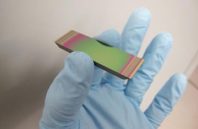It’s a truism that mechanical devices will eventually break down, and this applies to mechanical laser-beam steering systems as well as the family automobile. In particular, for chemical sensing and lidar applications, mid-infrared beam scanning needs to be rapid and reliable—and beam-steering mechanisms such as moving mirrors and rotating prisms tend to be slow and power-hungry.
A team of U.S. scientists has devised a non-mechanical chip-based steering device for mid-infrared laser beams. The chip continuously moves beams with wavelengths of 3 to 5 μm in two dimensions and at higher scan-speed rates than gimbal-powered mirrors and similar technology.
The chip, fabricated at the U.S. Naval Research Laboratory (NRL), is a kind of solid-state device called a steerable electro-evanescent optical refractor, or SEEOR. These chips have already shown promise for steering light beams at telecommunications wavelengths and may find their way into self-driving cars of the future. The NRL scientists believe that their SEEOR is the first to operate in the mid-infrared.

 (585) 768-2513
(585) 768-2513

